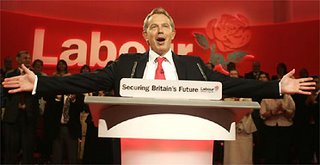 "I would relish the opportunity to take on David Cameron and the Conservative Party. And in that endeavour I would be determined to draw on all the talents of our party and country." So said Gordon Brown in his conference speech on Monday, in what was probably intended more as an "inclusive" gesture to his potential Cabinet rivals than a pledge to bring Tories and Liberal Democrats into a national unity Government.
"I would relish the opportunity to take on David Cameron and the Conservative Party. And in that endeavour I would be determined to draw on all the talents of our party and country." So said Gordon Brown in his conference speech on Monday, in what was probably intended more as an "inclusive" gesture to his potential Cabinet rivals than a pledge to bring Tories and Liberal Democrats into a national unity Government.By complete coincedence, however, the BBC is currently running one of its periodic Fantasy Cabinet games which does indeed give users the right to select a team of 10 drawn from all the major parties.
Mine is predictably left-of-centre in nature, though I have found room for two Lib Dems and two Tories. Gordon Brown gets the premiership of course, as befits the most towering figure in British politics besides Blair, but I've also found room for other leadership hopefuls John Reid, David Miliband and Alan Johnson.
My favourite Tory politician, David Davis, gets the Defence brief, while David Cameron gets the consolation prize of Culture Sec, a suitably lightweight post for an incorrigibly lightweight politician.
The full list:
Prime Minister: Gordon Brown
Deputy Prime Minister: Sir Menzies Campbell
Chancellor: David Miliband
Foreign Secretary: Peter Hain
Home Secretary: John Reid
Defence Secretary: David Davis
Health Secretary: John Denham
Education Secretary: Alan Johnson
Environment Secretary: Chris Huhne
Culture Secretary: David Cameron
Incidentally the BBC game also allows people to vote for TB. It will be interesting to see how many takers they get after yesterday.












